My day in Lightyear Frontier starts out with a bit of farming. On a good day, it’s raining, so I don’t need to water the crops. On a bad day, there are weeds spontaneously spawning from the sky and I need to catch them before they land right on top of my precious plants. Either way, when I’m done, I’ll put the day’s harvest into the processing machines to work while I’m away, and then go exploring for minerals.
My goals are clear. I need to build a new machine, or upgrade my mech so that I can clean up a new area of the map and get new resources in return. Those will – you guessed it – let me build new machines or upgrade my mech again. There might be a few steps to juggle on the way, but nothing that needs me to hold long recipe flowcharts in my head. When I get back I’ll have everything I need to take the next step. It always feels like I’m making forward progress.
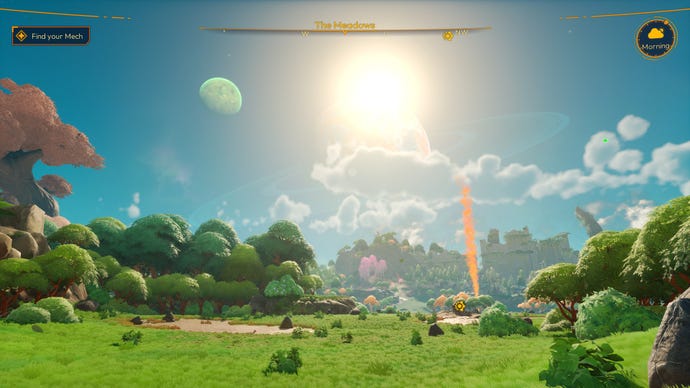
I carry out this routine basically undisrupted, raising round after round of alien crops that range from the familiar (Rabbage are cabbages, only red, and wheat is, well, wheat) to the conveniently strange (Zappertwigs, as the name suggests, are electric). I’m usually gone before the trader shows up, because she doesn’t really sell anything that I need – it’s all out there in the world for me to pick up myself. I could do some requisitions for a guy on the next planet over, but he pays me in money, and again, I don’t have much use for that.
I’ve got my mech to keep me company, although it doesn’t feel especially unique compared with the superhuman feats that characters in these sorts of games can do anyway. That isn’t really the fault of Lightyear Frontier, but when I’m used to being able to swing an axe a couple of times and break anything it doesn’t much matter if I’m in a giant metal suit instead – and you can do that if you’re ever outside of your mech, anyway. It’s nice being able to fly short distances and understand why you’re able to carry huge amounts of stone and iron, but other than that it’s easy to forget about, other than when my stomping around scares the local animals.
And then there’s PIP-3R. PIP-3R is a satellite who orbits around the planet, and after decades alone, they’re just happy to have someone to talk to. Or at least talk at, since you can’t reply. And, look, I have a lot of patience for companion characters – I don’t even have beef with Navi – but I know how these things go, and I fully expect that the first patch will drastically cut down on PIP-3R’s voicelines.
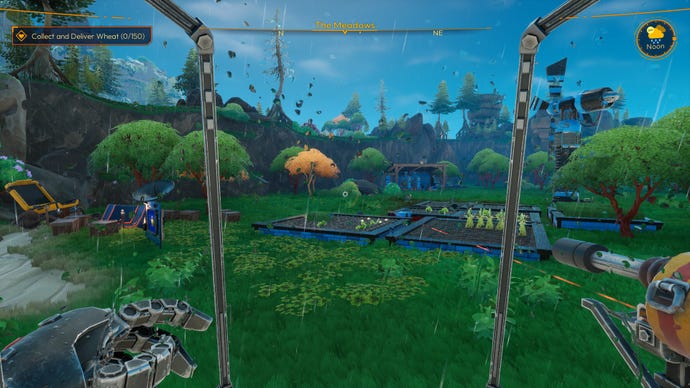
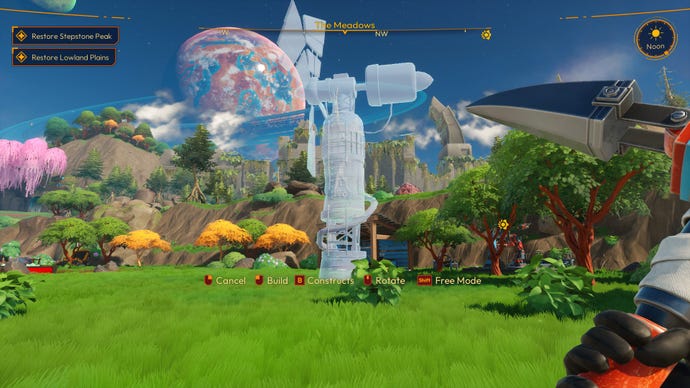
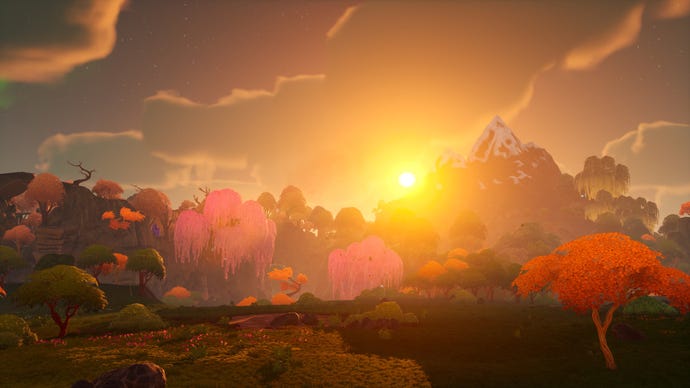
Those three aside, it’s just me and the planet. Wake up, farm, process, explore, build, sleep. It’s both meditative and full of momentum. Lightyear Frontier does also have up to four player co-op, which I can imagine being fun, but for me it was blessed, podcast-listening alone time. (This, by the way, is the solution to PIP-3R, although I feel a little bad because the rest of the sound design is all the crunchy, soil-turning, mech-grinding effectiveness that you could want.)
I can also imagine, though, that co-op play would not last very long right now. Alone, it only took me about eight hours to hit the ending of the game’s early access story. That meant cleaning up six areas of the map, each similarly decked out in colourful trees and minerals but with minor differences like pines over broadleaves or more valuable metal ores, upgrading my mech a few times with a stronger watering cannon and weed-whacking hoover attachment in order to do so. There was some more that I could have done – I ended up about half way through the upgrade tree – but without cleaning to do, that probably would have gone quickly, too.
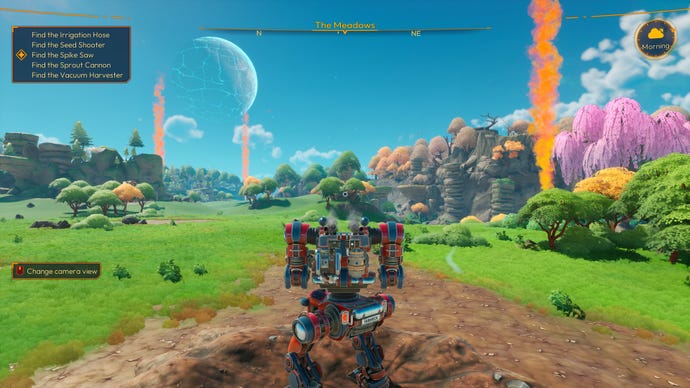
On the other hand, those not playing at a reviewer’s speedy clip may well want to settle into a slower rhythm of farming and exploring, which could theoretically go on forever. One aspect of that slower playstyle I didn’t really touch at all was the chance to decorate. Almost half of the build menu and even more of the trading opportunities were aesthetic considerations: campfires, fences, potted plants, and so on. I also crawled to sleep every night in the original tiny tent that I made, rather than building anything bigger. Naturally, dedicating resources to these would mean fewer to put into my mech and machinery, drawing out the pacing of the whole game.
But my drive to see the story ending in time to write this review wasn’t really the reason that I didn’t engage with those systems. And I’m relieved that the story isn’t finished, because it means I can talk about the question that I kept turning over in my head without getting into any spoilers.
The thing is, building anything in Lightyear Frontier felt kind of mean. The planet is gorgeous; all twisted, multicoloured trees and flowering shrubs and glittering crystals. Rattling my mech’s spiked arm to harvest them for resources and using them to forge giant bits of machinery didn’t seem especially cosy-wholesome-gaming to me. I tucked my entire farm into the shadow of a cliff face and kept it as small as possible, decorations were the last thing on my mind.

The game feels like it might be building towards subverting this – but I’m not sure. It opens on a stark line: “Earth’s no good anymore.” It certainly seems like the weird goop and invasive weeds that need clearing from each new area are linked in some way to the mysterious man-made ruins. The fact that they appear over your farm every few days certainly implies that you, too, are disrupting something.
But then I fall back into the day to day cycle. I need wood. I’m planting at least a few trees to replace the ones I’ve shredded, so that’s okay, right? I need minerals, and they regenerate so quickly that there’s no problem taking as much as I want – even quicker if you feed the local animals, in a causal relationship I don’t really understand beyond its acquiescence to the greedy player. So it would probably be fine, right? If I fenced off my farm. If I made it pretty. If I lived out my cottagecore dreams on this beautiful planet that seems to have been put here just for me?
Lightyear Frontier brings up just enough questions to feel uncomfortable and then sets you off on a loop with such forward momentum that you can’t do anything with them. And that momentum is fun, and its questions leave me curious, both of which are good things for an early access farming game. I will probably come back to both enjoy more of those chill, resource-guzzling days and to find out what the game has to say about them. Whether I’ll be satisfied in the end, though, remains to be seen.
This review was based on a review build of the game provided by developers Frame Break.










Add comment